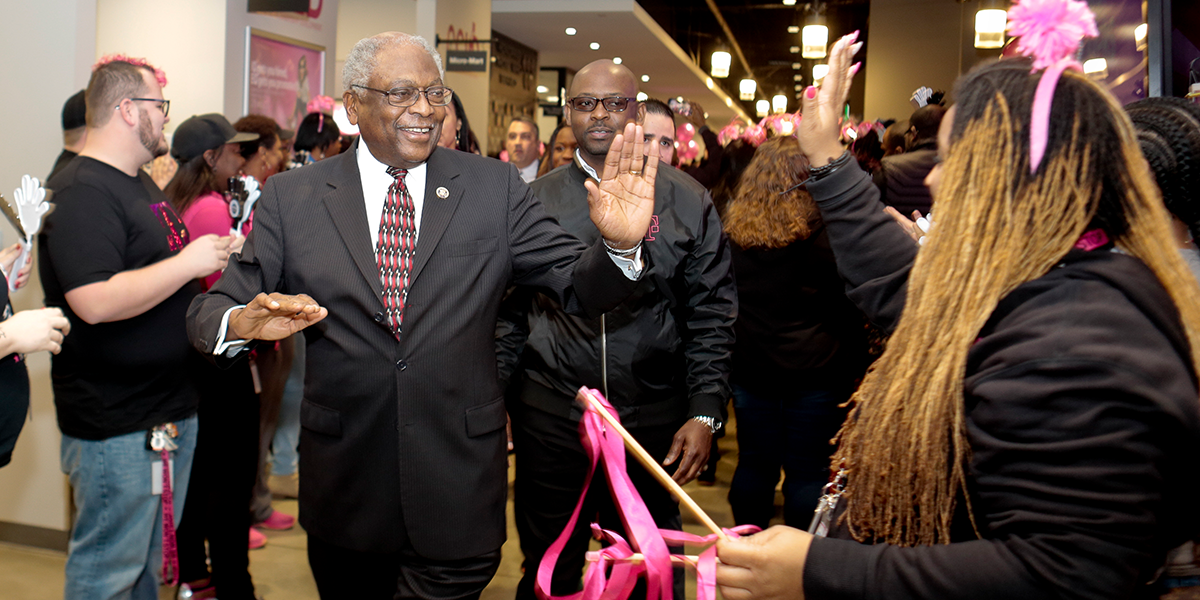In recognition of Black History Month, 14-term Congressman from South Carolina and House Majority Whip Jim Clyburn visited T-Mobile’s Customer Experience Center in Charleston as part of its Talking with Trailblazers guest-speaker series—which features some of the brightest, most innovative, creative and diverse leaders from across the country talking about topics that matter—to speak about his pre-teen entry into politics, the importance of championing the underdog and how to make the inner diamond in all of us sparkle. Here, five key Trailblazer Takeaways from Clyburn that will inspire.
Witnessing and experiencing inequality can light a spark.
“I grew up at the time that things began to bubble up. World War II had just ended. You had African-American soldiers who had gone off to help fight a war—a war that we won. But when they came back to their communities, the kinds of opportunities that were open to white soldiers and veterans just were not open to black soldiers and veterans, and that’s what sparked the so-called Civil Rights Movement. Those soldiers coming back from World War II started to agitate for equal opportunity, being a part of the GI Bill, getting the loans to build homes that the white soldiers got and black soldiers did not get. As a kid, that’s what I was a part of.”
If the underdog can do it, so can you.
“I remember Harry Truman running for president in 1948, and people saying he couldn’t win. He did not have a college degree. He was not from a well-heeled family. He ran against Thomas Dewey, a wealthy New Yorker. The Chicago Daily Tribune didn’t even wait for the polls to close before they went ahead and printed the next day’s headline: ‘Dewey Defeats Truman.’ Well, when the vote was counted, Truman had won. I remember thinking, ‘How could this little guy, not all that extensively educated, coming out of a very modest background, take on this big machine and be successful?’ I said to myself, ‘If Harry can do it, I can do it!’ And Harry Truman became my role model, and is to this day.”
You’re never too young to make your mark.
“In 1953, I went to this church where they were organizing a youth council of the NAACP. I think I went to the restroom or something [laughs], and when I came back into the room they announced, ‘You are our president.’ Three months before my thirteenth birthday, I was elected president of the youth council of NAACP. From there, I just grew into my political life.”
How you grow up doesn’t have to define you forever.
“I spent a lot of time last year reading up on Alexis de Tocqueville, who wrote that there’s a certain genius about America, and that he wanted to find out what it was. He was a historian from France who came here in 1831 to study our penal system. He came to the conclusion that America is great, not because it’s more enlightened than any other nation, but because it’s always been willing to repair its faults. I often talk about Ron McNair. He was a black astronaut who lost his life in the Space Shuttle Challenger explosion in 1986. Just before he died, he visited with me. He was about to become a professor at the University of South Carolina and talked a lot about growing up in the little town of Lake City, South Carolina, and the challenges he had growing up and what he had to overcome. He was not allowed to use a library in his hometown. Here’s this guy, who went on to get a PhD from MIT, but as a kid he was told that he could not come into the library in his hometown. That library was great but he could not use it. He overcame all of that. We are a great nation. We’ve been great for a long time. But I think we still need to make the greatness of America apply fairly and equitably to all of its citizens. We have to remember, that no matter where you were born, no matter what your environment may have been, that does not have to define you forever.”
There’s no value in a diamond until it’s been dug up.
“Someone asked me just today, ‘Why is it that you often refer to Historically Black Colleges and Universities – HBCUs we call them – as national treasures?’ I said, If you think about, say, a diamond, we consider diamonds a treasure. But the fact of the matter is, when that diamond is still in the mine, covered up, it’s useless. It has no value. It gets value when it’s dug up. Cleaned off. Cut. Polished. So get polished. Further your education. Get as much as you possibly can. You will be forging a treasure that can be unleashed to make a life of value, not just for you, but for your children, your grandchildren and all others with whom you come in contact with. That’s what it’s all about. So just do it. Unearth your potential. Become that polished diamond that sparkles.”


